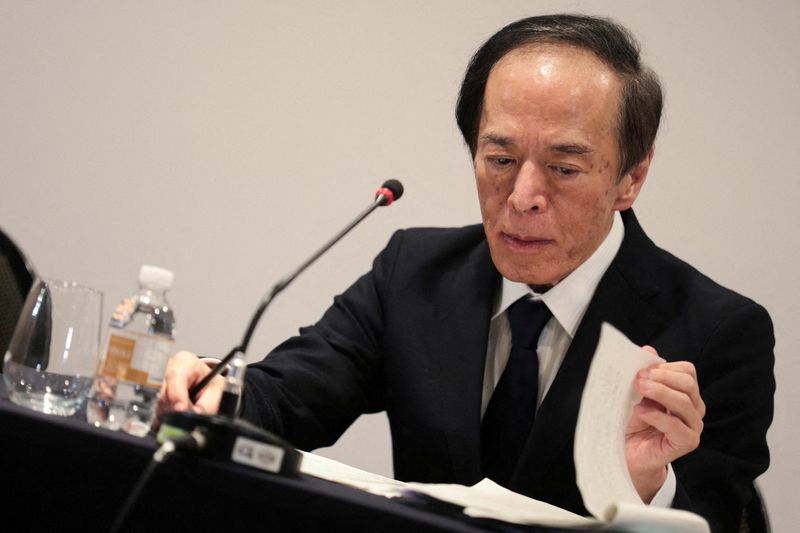By Leika Kihara
TOKYO (Reuters) -Bank of Japan Governor Kazuo Ueda said on Tuesday the economy was recovering but also showing some signs of weakness, offering a slightly bleaker assessment than in January in a nod to a recent batch of soft data on consumption.
The remarks come ahead of the central bank's policy meeting next week, where the board will debate whether the outlook is bright enough to phase out its massive monetary stimulus.
Speaking in parliament on Tuesday, Ueda said consumption was weakening for food and daily necessities amid higher prices. But he said household spending was improving moderately on hopes for higher wages ahead.
"Japan's economy is recovering moderately, although weakness has been seen in some data," Ueda said, when asked by a lawmaker about recent soft signs in consumption and capital expenditure.
The assessment was slightly less optimistic than the one shown in the BOJ's latest quarterly report issued in January, which described the economy as "recovering moderately".
Ueda offered few clues on how soon the BOJ would end negative rates, a policy that has been in place since 2016.
But he said there were various ways to push up short-term borrowing costs if conditions fall into place to end negative interest rates.
Under its negative rate policy, the BOJ currently charges a 0.1% interest to excess reserves financial institutions park with the central bank to encourage them to lend out the money.
One idea would be to pay a positive interest to the reserves, which would help push up the overnight call rate, Ueda said. If inflation accelerates and warrants tightening monetary policy further, the BOJ can do so by raising short-term rates instead of unloading its huge bond holdings, he added.
"We are focusing on whether a positive wage-inflation cycle is kicking off, in judging whether sustainable, stable achievement of our price target is coming into sight," he said.
"Various data have come out since January and we'll likely have additional data come out this week. We will look comprehensively at such data, and make an appropriate monetary policy decision," he said.
BOND GUIDANCE EYED
Upon ending negative rates, the BOJ is also likely to ditch its yield curve control (YCC) - a policy that guides the 10-year bond yield around 0% with a loose cap of 1%.
The BOJ will likely offer numerical guidance on how much government bonds it will buy upon ending YCC to avoid causing market disruption, said sources familiar with its thinking.
Japan's economy expanded at an annualised clip of 0.4% in the October-December period, narrowly averting a technical recession but weighed by sluggish consumption.
Despite such signs of economic weakness, many market players expect the BOJ to end its negative interest rate policy by April as inflation remains above its 2% target and intensifying labour shortages prod more firms to signal bumper pay hikes.

Sources have told Reuters a growing number of BOJ policymakers are even warming to the idea of ending negative rates at the March 18-19 meeting on expectations of hefty pay hikes in this year's annual wage negotiations.
Economists see current wage talks, which wrap up on March 13, resulting in an average hike of around 3.9% in annual pay for union workers at major firms - the biggest rise in 31 years.